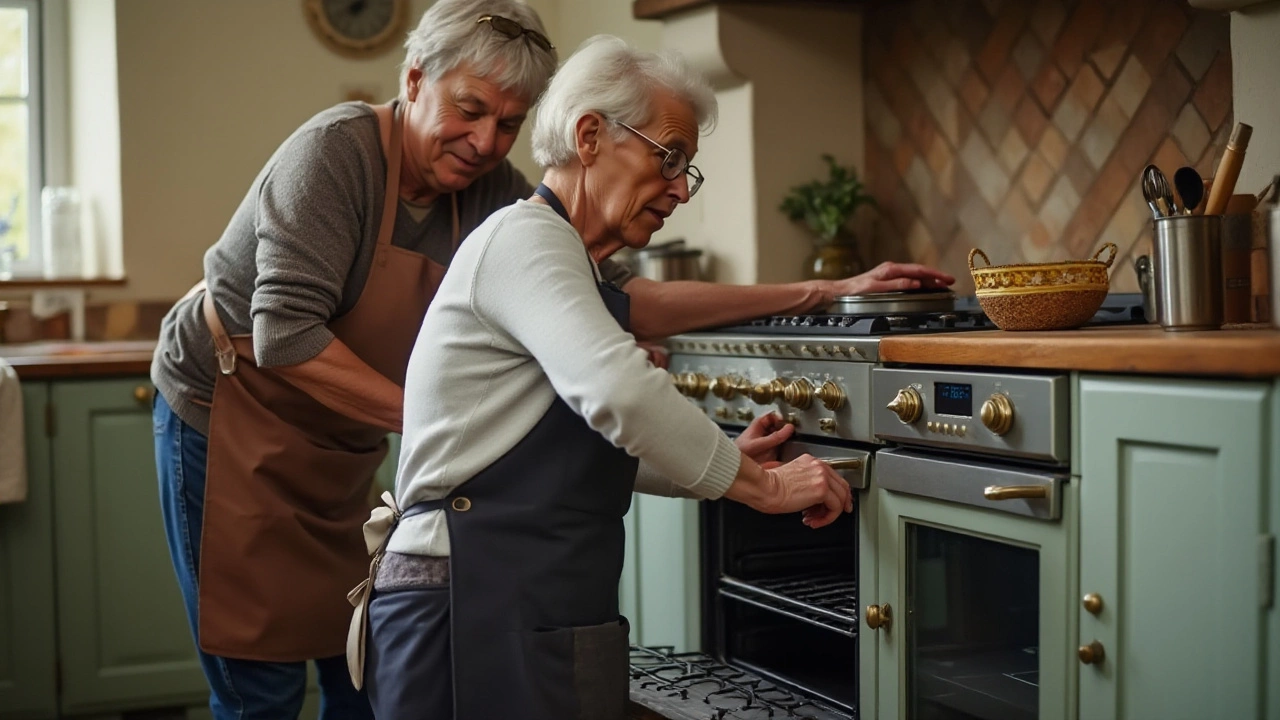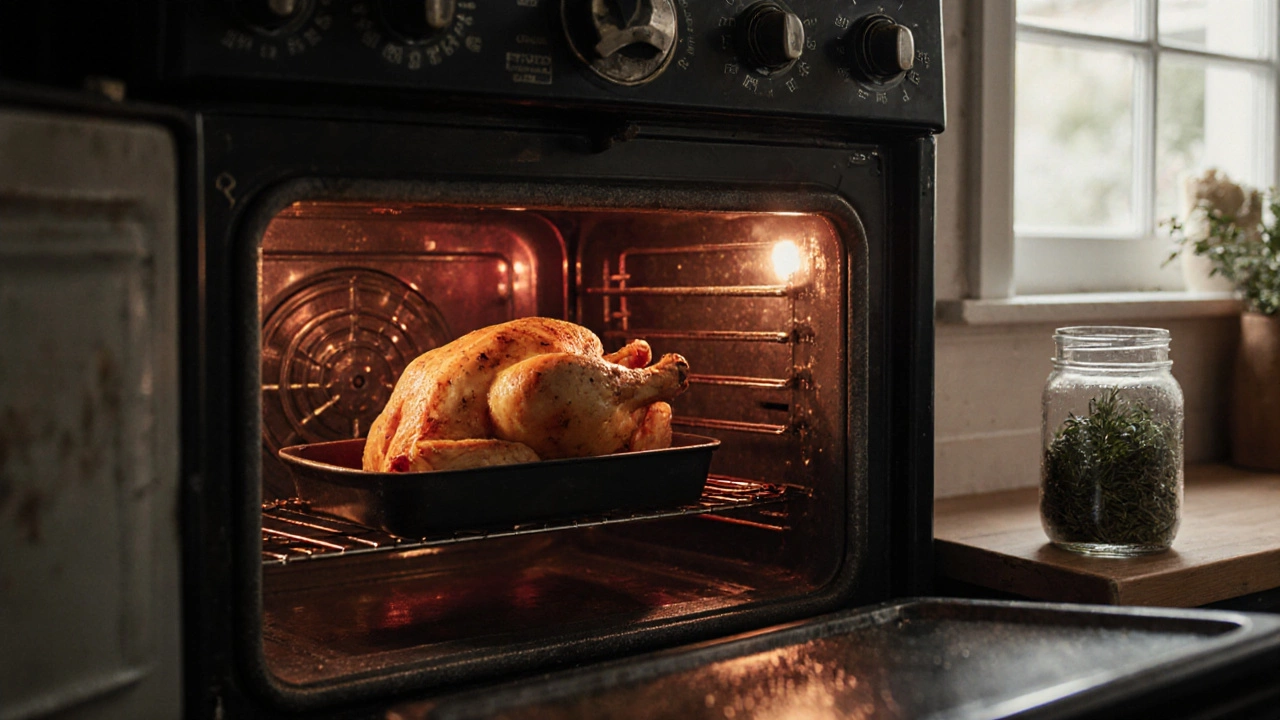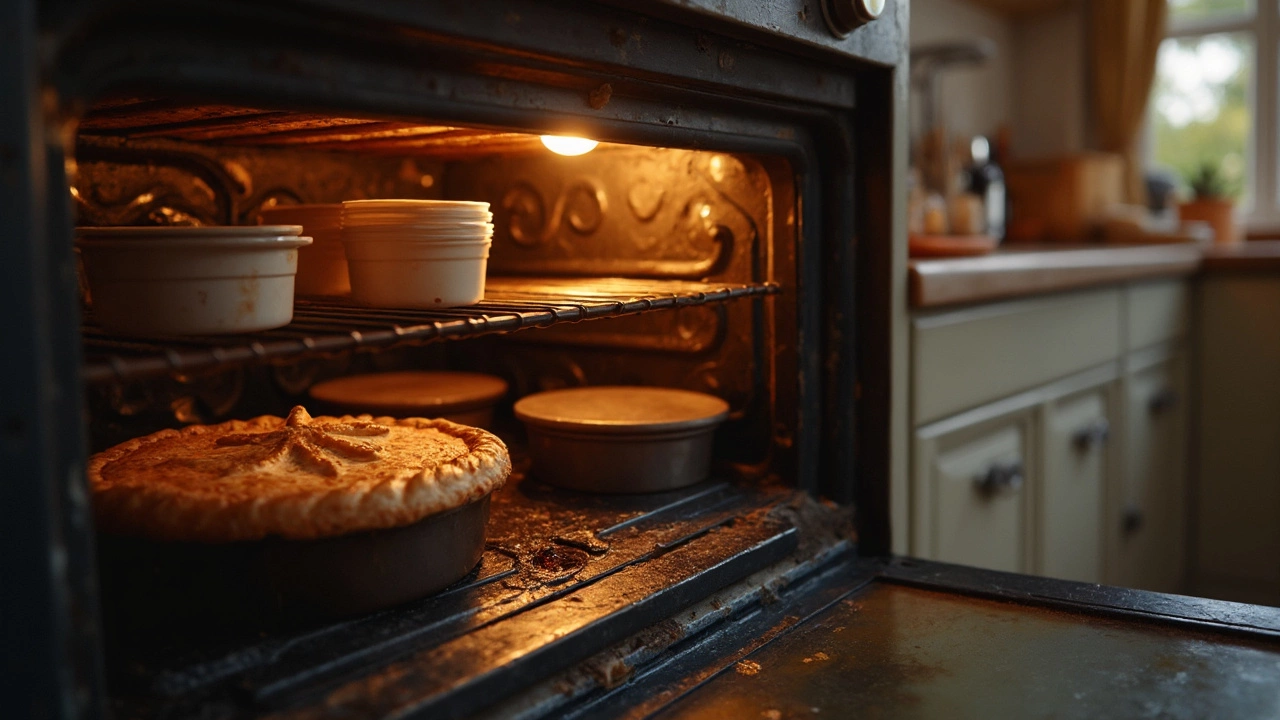
- 19 Dec 2024
- Gideon Thornton
- 0
Choosing an electric oven that stands the test of time can make all the difference in a kitchen. Why settle for an appliance that breaks down in a few years when you can have one that lasts decades? The market is brimming with brands, each promising exceptional durability, yet how do you separate the wheat from the chaff?
In this article, we aim to shed light on the key factors that impact an oven's lifespan, pointing you in the direction of reliable manufacturers renowned for their robust designs. Whether you're a cooking enthusiast who relies on daily appliance performance or someone who enjoys the occasional bake-off, understanding which brands prioritize durability can save you time and money.
We’ll also explore the essential features that can boost your oven's longevity and share practical maintenance tips to keep it functioning optimally. Let's embark on this path to finding a trusty kitchen companion that will serve you for years to come.
- Understanding Longevity in Ovens
- Top Brands Known for Durable Ovens
- Features That Enhance Oven Lifespan
- Maintenance Tips for Long-Lasting Performance
- Choosing the Right Oven for Your Needs
Understanding Longevity in Ovens
When it comes to electric ovens, durability is often a key consideration for buyers aiming for long-term value. An oven's lifespan is influenced by a myriad of factors, ranging from the materials used in its construction to the technology incorporated within. It's significant to grasp that how frequently an oven is used and maintained also plays a pivotal role. Some brands have mastered the art of combining high-quality workmanship with innovative technology to create products that can endure decades of usage, making them a league apart in this competitive market.
The materials used in the manufacture of ovens can significantly affect their longevity. Brands that prioritize heavy-duty stainless steel not only ensure a robust structure but also offer resistance against rust and wear, critical for prolonged operation. Internal components such as heating elements or fan motors crafted from high-grade alloys can withstand the test of time, reducing the need for frequent replacements. Not to neglect, energy efficiency, which has become a decisive factor, for modern electric ovens that often include sophisticated heat distribution systems aimed at minimizing energy consumption without compromising on performance.
Technology has also played a decisive role in extending the life of modern ovens. The introduction of self-cleaning features, for instance, reduces the manual labor involved, ensuring that the appliance remains in tip-top shape. Touchscreen controls, though initially considered a luxury, provide precision in temperature settings, preserving the health of internal components by avoiding overheating. Surprisingly, proper insulation in ovens not only aids in retaining heat, increasing cooking efficiency but also safeguards electronic parts from thermal damage.
"The longevity of an appliance is increasingly becoming a testament to its brand's reputation," says Harvey Brooks, an industry expert in home appliances.Another interesting aspect is the evolution of designs that facilitate user maintenance. Motorized rotisseries and removable racks may seem like simple conveniences, yet they allow users to perform necessary cleaning and lubrication, which directly affects how long an oven lasts. Maintenance often requires a bit of elbow grease, involving steps like keeping the vents clear, checking seals for signs of wear, and ensuring that electrical connections stay secure.
The choice of a lasting electric oven isn't solely about selecting the right brand but also involves understanding the intricate details of what makes these appliances endure the rigors of time. The next time you're in the market for an oven, consider these aspects critically. Perhaps keeping an eye on product reviews and testimonials from other users who have reached the long-haul stage with their ovens may provide practical insights. As technology continues to advance and resource costs fluctuate, brands that consistently champion quality in their manufacturing process will likely remain favorites among those who seek durable kitchen essentials.
Top Brands Known for Durable Ovens
Electric ovens have become a staple in modern kitchens, and when it comes to durability, a few brands consistently rise above the rest. These manufacturers have earned their reputation through years of producing reliable appliances that not only deliver exceptional performance but also stand the test of time. Among these, Bosch, KitchenAid, and Miele are often hailed as front-runners in the industry. Their commitment to crafting long-lasting ovens that integrate advanced technology with robust construction sets them apart.
Bosch, known for its German engineering, is often lauded for producing durable brands. Many households have found that Bosch models feature not only sleek designs but also innovative technology designed to enhance performance and longevity. Their ovens usually incorporate features like precision temperature control and self-cleaning capabilities, which contribute significantly to a longer lifespan. Moreover, Bosch appliances are often backed by comprehensive warranties, a testament to their confidence in product durability.
KitchenAid brings its own unique attributes to the table. Known for their versatility, KitchenAid ovens are built with the home chef in mind, offering features that cater to both beginner and experienced cooks alike. The brand emphasizes durability in its model lineup by using high-quality materials such as stainless steel and offering robust insulation that helps maintain efficiency over time. KitchenAid consistently ranks high in consumer satisfaction surveys, reflecting a strong reputation in the appliance industry.
"Investing in an appliance with a strong track record for durability can save you money in the long run," says a representative from Consumer Reports, highlighting the importance of research before making a purchase.
Miele’s reputation is built on luxury and performance. Renowned for their elegant design and meticulous build quality, Miele ovens are often found in high-end kitchens. This German manufacturer focuses on detail, offering models that feature moisture regulation and rapid heating capabilities, ensuring not only faster cooking times but also prolonged appliance life. Their ovens are subjected to rigorous testing before they hit the market, guaranteeing that each unit upholds Miele’s standard of longevity.
Sifting through countless brands and models can be daunting, but considering these top contenders can simplify your decision. Each brand not only provides outstanding oven lifespan but also offers features that cater to different cooking styles and preferences. Whether you prioritize innovation, high-end design, or versatility, these brands ensure your electric oven is a steadfast kitchen companion for years.

Features That Enhance Oven Lifespan
When it comes to electric ovens, not all are created equal. Some boast features specifically designed to extend their lifespan, making them a worthwhile investment for your kitchen. One critical factor to consider is the material of construction. Ovens made with high-grade stainless steel or enameled cast iron tend to withstand the rigors of daily use far better than those constructed with cheaper materials. Stainless steel is not only resistant to rust and corrosion, but it also withstands high temperatures without warping or degrading.
Another aspect to examine is the quality of the heating elements. High-quality ovens use durable elements that provide consistent heat distribution. These elements are often covered with a protective coating to prevent them from oxidizing and becoming inefficient over time. Some advanced models even have self-cleaning technology that reduces the risk of element damage by cleaning at controlled high temperatures. Notably, convection ovens with fans that ensure even heat circulation also tend to have a longer functional period, as they require less intense heating for the same cooking effect, which reduces wear on the heating components.
Now, consider the oven's control systems. Digital controls may often be considered delicate, yet they frequently include precision sensors that optimize energy usage and cooking time, lessening the strain on the oven components. Mechanical dials, on the other hand, might lack precision but have fewer parts that can fail. For digital controls, protective circuit board coatings can shield against dust and grease, prolonging the control panel's life and maintaining accuracy.
According to a Consumer Reports study, "Ovens with convection and self-cleaning features often lasted the longest on average, suggesting that these features are not merely conveniences but can also contribute to the longevity of the appliance."
Let's not forget about insulation. Ovens with high-quality insulation materials reduce energy consumption by maintaining heat internally. This feature prevents the exterior from becoming too hot, which not only helps in conserving energy but also protects the rest of the kitchen appliances and cabinetry from heat damage. Efficient insulation also decreases the workload on the oven, slowing down the wear and tear of its components.
Finally, investigate the design of the oven's door and seal. A well-constructed door with a durable seal ensures that heat doesn't escape, keeping cooking efficient and preventing excessive energy waste. A robust door design also protects the oven from quick temperature changes that can damage the internal components. Check the hinges and seals regularly for wear and replace them when necessary to maintain energy efficiency and effectivity of your oven.
Maintenance Tips for Long-Lasting Performance
When it comes to keeping your electric oven in optimal condition, regular maintenance is key. Neglecting your oven can lead to reduced performance and even shorten its lifespan, no matter the brand. Simple yet consistent upkeep can make a significant difference in ensuring your appliance remains a reliable part of your kitchen for years. One effective strategy is to establish a cleaning routine. It's important to clean spills and splatters as soon as possible after cooking, especially if the oven has self-cleaning features. Consistency prevents accumulation of grime, which can negatively impact heating elements and the internal walls of the oven.
Apart from cleaning, be diligent in inspecting the seals. These play a crucial role in maintaining the temperature within your electric oven. Worn-out door seals can lead to heat loss, causing the oven to work harder and ultimately reducing its efficiency and lifespan. To check their condition, open the oven door and inspect the edges for signs of wear or brittleness. Replacing them when necessary will help maintain your oven's efficiency. Additionally, test the thermostat regularly to ensure that it is accurate. An inaccurate thermostat can lead to unevenly cooked dishes and place undue stress on the heating elements, causing premature wear.
Moreover, routinely checking the condition of your oven's heating elements is vital. Properly functioning elements are essential for an efficient cooking process. If you notice uneven cooking or longer cooking times, that may indicate failing elements. Replacing these parts before they completely fail can prevent further complications down the line. It's also beneficial to regularly calibrate the oven's settings to ensure the accuracy of its temperature readings. Calibration is particularly crucial if you've found yourself frequently adjusting cooking times or temperatures.
Another tip is to use the right cookware. Avoid placing cold dishes directly into a preheated oven as the sudden temperature change can cause stress on both the cookware and the oven itself. Opt for oven-safe materials that can withstand high heat without warping or breaking. Additionally, avoid overloading the oven. Placing too many items inside can block airflow, leading to inefficient cooking and straining the motor. Maintaining proper air circulation allows for even heat distribution and ensures consistency in your cooking results.
According to the U.S. Department of Energy, "Regular maintenance of home appliances can extend their life by up to 20%"—a small effort for a substantial payoff.
Lastly, don’t overlook the oven's exterior. Keeping control knobs, vents, and the oven's surface clean can prevent button stickiness and maintain overall hygiene. Removing build-up around vents allows the oven to cool efficiently after use, reducing the risk of overheating. By integrating these maintenance practices into your regular kitchen routine, you can significantly extend the life of your electric oven and maintain its performance. This approach not only saves on potential repair costs but also ensures you get the most out of your investment in durable brands.

Choosing the Right Oven for Your Needs
In the quest to find the perfect oven, one must start by considering its primary use in the kitchen. Whether your aim is to bake buttery pastries or roast grand family meals, defining your cooking preferences will guide you to the right selection. For those who frequently entertain guests or have a large family, an oven with a spacious interior is essential. Look for brands that provide plenty of room without sacrificing even heat distribution, which is key for cooking multiple dishes at once. Similarly, the placement of heating elements can make a huge difference. Some ovens are equipped with rear heaters to encourage uniform heat, a feature that adventurous bakers might find particularly appealing.
Meanwhile, the level of customizability might play a crucial role in your decision. Ovens that allow you to adjust parameters like temperature gradients and cooking modes provide greater control and versatility. Take, for example, the popular convection feature, which circulates air for quicker, more even cooking and often boasts energy efficiency. A convection oven might be your best bet if energy saving or speed is important to you. Also, consider whether you want a traditional built-in model or a countertop unit, as the latter can offer flexibility in smaller spaces or shared kitchens. As always, assessing the specific needs of your household will help narrow down your choices.
It's also worth exploring the smart technology options available today. Modern ovens often come with Wi-Fi capabilities, allowing for remote control via smartphone. Imagine preheating your oven while still at the grocery store or receiving notifications when your dish is done. A 2023 study revealed that households with smart appliances reported a higher satisfaction rate, citing convenience as a major advantage. Nevertheless, these advanced features might come at a premium, so it's important to weigh the benefits against costs for your budget.
The material used in construction can significantly affect an oven's durability. Stainless steel is revered for its resilience against rust and wear, making it a popular choice for those focusing on long-lasting ovens. Even heat distribution from materials like ceramic or glass increases efficiency and can be considered when looking for durable brands. Additionally, check the oven's warranty – a longer warranty often implies the manufacturer's confidence in the appliance’s longevity, providing peace of mind in your investment.
Shopping for the right oven should also consider how user-friendly the appliance designs are. Controls that are intuitive and easy to understand can greatly enhance your cooking experience. A digital display that gives precise readouts of temperature and settings can make a world of difference. Some reputable models even have touchscreens to simplify complex tasks. If possible, visit a showroom to see whose interfaces feel most comfortable to you, which can be a deciding factor often overlooked during online shopping.
Lastly, don't forget to read customer reviews and expert opinions prior to purchase. Many consumers like you often share their experiences on diverse online platforms, providing insights that might resonate personally. Consider their shared experiences, especially those who have used the electric ovens extensively enough to relay feedback on longevity, reliability, and performance consistency. So, make sure to weigh these points comprehensively to ensure you select a model that not only fits your needs but stands out as a smart, practical choice in your unique culinary journey.



